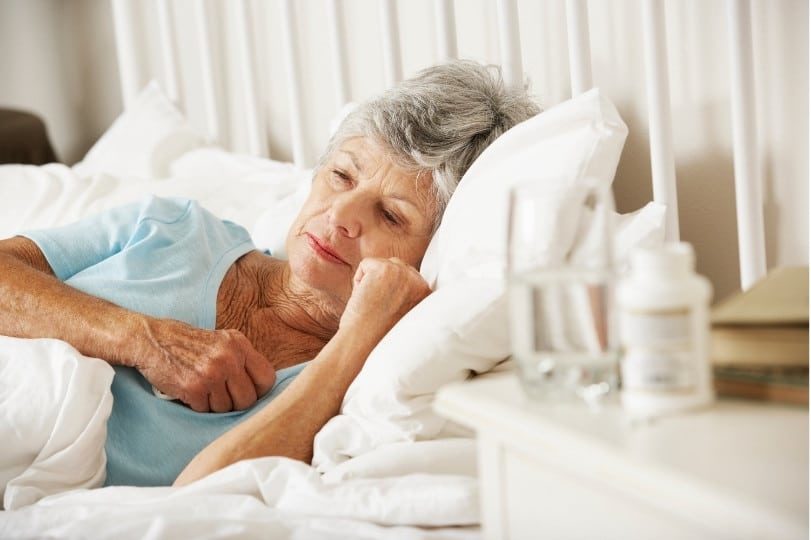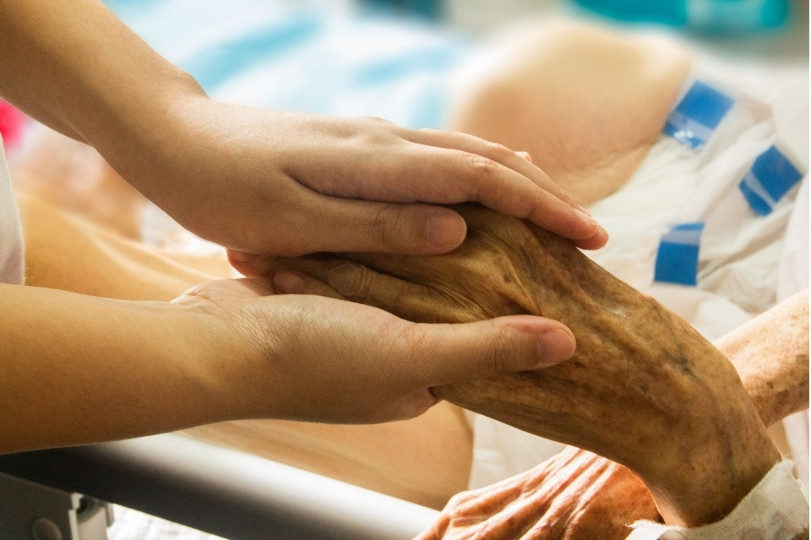
Haldol & Nausea: Keeping Sickness at Bay
April 13, 2021
Mottling of the Skin Before Death
April 13, 2021Why is Death Painful & What Can be Done About It?
Imagine you are in the ocean, fighting to get to the surface. Your lungs are burning. Air is running out. CO2 is rising.
Now imagine you are lying in bed. You are nauseous and cannot keep anything down. You have not eaten in days – no food, no water. Every hour you are growing weaker. It is hard to stay awake. Just sitting up leaves you exhausted.
What’s more, you are becoming confused. Nothing makes sense anymore. Sometimes you do not even know where you are.
Then, as your anxiety lifts, you are left gasping for air. Your heart cannot pump blood properly, so there is fluid building up in your lungs. When you breathe, there’s gurgling, crackling, and secretions. Imagine your anxiety and desperation. You are fighting to get to the surface.
That is what we go through when we die. It is not comfortable, nor is it dignified. But it can be. With the support of hospice and palliative care, it is possible to avoid a painful death.
The philosophy of hospice care
Hospice exists to alleviate suffering. Though we do not like to think about it, our lives are finite. No matter how hard we fight, our health will eventually fail.
When this happens, people’s priorities change. They want to say goodbye to their loved ones. Savor their final moments. And come to terms with their unresolved issues. But a painful death interferes with this, which is why so many people turn to hospice to manage the transition from this life to the next.
Hospice does not treat illness, it treats symptoms. It does everything in its power to relieve pain and discomfort, so patients can make the most of the time they have left.
How hospice prevents death from becoming painful
Hospice care is delivered by a team of professionals working together to improve quality of life. It is a holistic approach that addresses every aspect of a patient’s physical, spiritual, and psychological wellbeing, including:
- Pain. Morphine is the primary tool used to combat pain. Despite many people’s fears, morphine does not accelerate death. In fact, the opposite is true. When used correctly, it can extend a person’s life. Pain is stressful. Fighting it puts pressure on your heart and lungs, which can hasten your decline.
- Air Hunger. Severe shortness of breath is common in dying patients. Hospice workers treat it by administering oxygen, opening the bronchials, and by giving morphine, which stops hyperventilation.
- Anxiety. Anxiety presents both physically and psychologically. Physical symptoms are treated with medication like lorazepam. Psychological symptoms are treated by the chaplain and social worker, who help relieve emotional distress.
- Depression. No one wants to die, which is why so many of us become depressed towards the end of life. The hospice chaplain works with patients to find meaning in what they have accomplished and assuage their fears about the unknown.
- Grief. Death is painful for both patients and families, which is why every team includes trained counselors. They help people accept the reality of the situation and make peace with it. This continues for up to 13 months after the patient’s death. The counselor checks in regularly to help the family through difficult milestones (birthdays, holidays, etc.)
Hospice even includes basic home care. They employ health aides to assist with bathing, grooming, and housekeeping. This removes some of the day-to-day stress facing families, so they can focus on what is most important.
Honoring the patient’s final wishes
Whether it is given in an assisted living home or as nursing care at home, hospice revolves around the patient. We all want to share our final days with our family, but we do not want to become a burden. We want to maintain our dignity, which a painful death denies us.
Most of all, we want control over our life, which is why most of us would prefer to die at home. Hospice gives us that opportunity.
For families looking to do right by their loved one, hospice helps draw them closer. Assisting the hospice team allows them to be in-home caregivers.
When families provide at home elderly care, quality of life improves. Remember, no one who is in pain interacts positively with the people around them. They are agitated, irritable, and withdrawn. Instead of reaching out, they lash out.
But when you take away the pain, the dynamic reverses. And no one is better at this than family. They know the patient intimately and can react faster than any nurse, no matter how well-trained.
Avoiding a painful death
Hospice believes no death should be painful. It empowers patients, centering their concerns for a peaceful death. It recognizes that growth and happiness are possible even at the end of life and does its best to ensure nothing stands in the way of them.
Jose Escobar is the Hospice Executive for Parentis Health. He works with patients and families across Southern California, providing support and education, in order to alleviate the pain and suffering of chronic and terminal illness.
Lewis Jackson writes about technology and healthcare. His work provides practical insight into modern medicine and healthy living.

